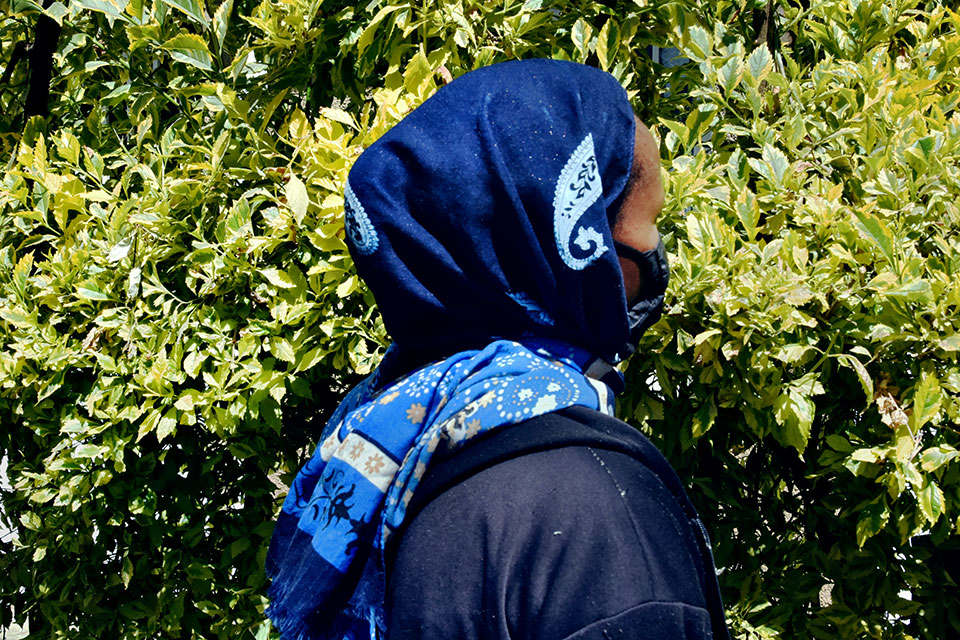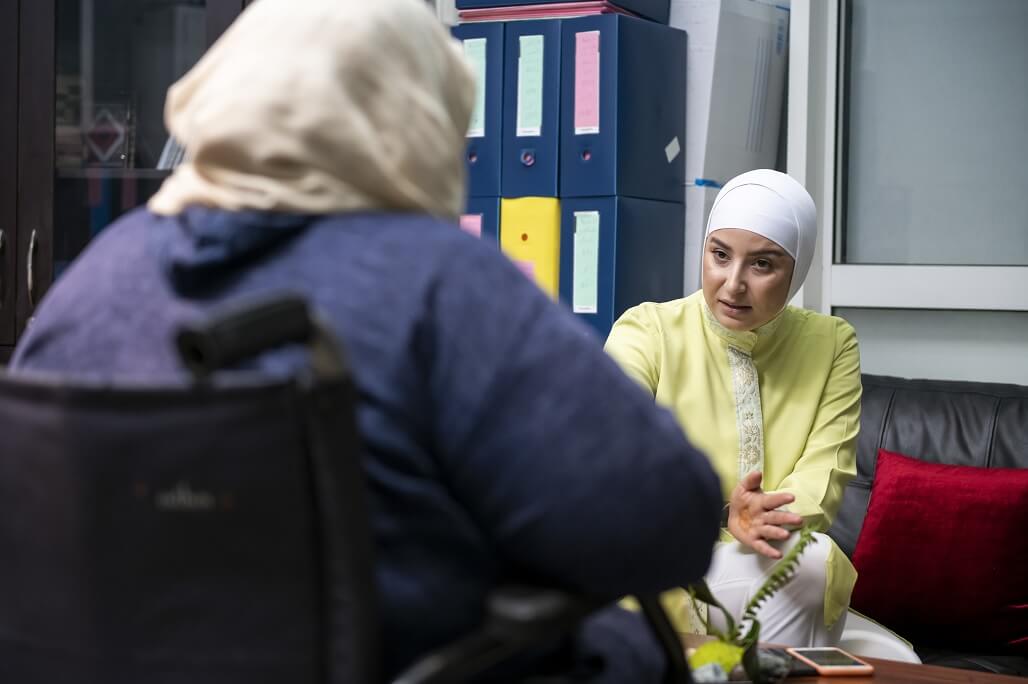


Trafficked and returned: Supporting migrant women survivors in Ethiopia during COVID-19
“The soldiers were shooting us from behind as we ran away in the forest. Some girls were raped and beaten. When we got caught [in a neighbouring country], the police made us sleep next to a toilet. We had to beg them for food,” shares Alem Kifle* about her migration journey. “When you are an illegal immigrant, you are considered less than dogs.” Read more >
Hidden mobile app gives women in Serbia a safer alternative for reporting violence
Women experiencing domestic violence often have their access to communication channels restricted by their abusers. Abusers may also regularly control or monitor their communication with the outside world. Existing ways of reporting violence require survivors to have a conversation via telephone or messaging, both of which can be difficult to conceal and may put women at greater risk if their abuser finds out.
Collection and use of administrative data on violence against women migrant workers is fundamental in planning, monitoring and service provision for this group of at-risk women
The UN Women Regional Office for Asia and the Pacific (ROAP) has focused on strengthening institutional capacity in the collection and use of administrative data with regard to violence against women and girls (VAWG). UN Women, the Association of Southeast Asian Nations (ASEAN), the ASEAN Commission on the Promotion and Protection of the Rights of Women and Children (ACWC), and the ASEAN Committee on Women (ACW) developed the ASEAN Regional Guidelines on Violence against Women and Girls Data Collection and Use. In 2022, a key step in this journey was the regional capacity strengthening workshop on the collection and use of VAWG administrative data, organized with country offices and partners. The Guidelines have been translated into five ASEAN languages—Bahasa Indonesia, Khmer, Burmese, Thai and Vietnamese—and integrated into local referral mechanisms such as Standard Operating Procedures. Countries and partners in the region are using these guidelines and, as a result, have the capacity to report on the number of VAWG cases and feed it back to their service provision systems.
An example of improved institutional performance in collecting and using administrative data is an initiative by the Department of Foreign Affairs of the Philippines. As a result of the technical support from the UN Women Regional Office and the Philippines Office, the Department of Foreign Affairs of the Philippines recorded support for 34,481 migrants (22,258 women) as administrative data from July to December 2021. The data was reported from the embassies and consulates in the ASEAN, Middle East and North African regions. After the aforementioned regional capacity strengthening sessions, the Department of Foreign Affairs requested in-depth training on violence against women migrant workers, with a focus on foreign service officials in embassies and consulates who are supporting Filipino migrants abroad. The training focused on gender-sensitive and survivor-centred VAWG data collection, with specific considerations for migrants. After the training, UN Women provided technical support in strengthening the data system of the Department of Foreign Affairs, which has resulted in a systematic and institutionalized data collection that informs policies, programmes and plans.
In Thailand, three local referral mechanisms were established in Bangkok, Chiang Mai and Mae Sot and formalized through local Standard Operating Procedures. They received extensive technical support from both the regional office and the Thailand office in developing and institutionalizing standard in-take forms with the minimum data set required for cases of violence against women, including women migrant workers. These referral mechanisms recorded the support for 76 women migrant workers who experienced violence against women.
The various initiatives for collection and use of administrative data on VAWG over these years have not only supported the ASEAN Member States in advancing their obligations toward international norms and standards, such as monitoring of VAWG-related indicators, but also improved service provision by enabling policies and plans to be better informed by evidence.
Read More:
- ASEAN Regional Guidelines on Violence against Women and Girls Data Collection and Use (available in English, Khmer, Bahasa Indonesia, Myanmar, Thai, and Vietnamese)
- Practical Guide: Developing Standard Operating Procedures (SOPs) for a Coordinated Response to Violence against Women, including women migrant workers
- “The GBV Task Force has changed my life” - strengthening services for survivors of violence in Thailand
In the words of Fadoua el Filali: “We are here to serve her and to fulfil her rights”
Fadoua el Filali is Head of the Cell for Women Victims of Violence at the First Instance Court, Salé. She has been assisting women survivors of violence to access justice and other essential services for many years. Recently, she has worked to find new ways to reach and help women during the COVID-19 pandemic.
“It is a battle. To win this battle, we must use all the available resources and work with everyone - police, health providers, the National Mutual Aid, local authorities and civil society organizations. We must constantly coordinate to ensure the safety of women. We must communicate, share experiences and keep improving our response services. We cannot overcome this battle alone. Read more >

Ethiopia: Trafficked and returned
“The soldiers were shooting us from behind as we ran away in the forest. Some girls were raped and beaten. When we got caught [in a neighbouring country], the police made us sleep next to a toilet. We had to beg them for food,” shares Alem Kifle* about her migration journey. “When you are an illegal immigrant, you are considered less than dogs.” Read more >

Serbia: App for reporting violence
Women experiencing domestic violence often have their access to communication channels restricted by their abusers. Abusers may also regularly control or monitor their communication with the outside world. Existing ways of reporting violence require survivors to have a conversation via telephone or messaging, both of which can be difficult to conceal and may put women at greater risk if their abuser finds out.
Southeast Asia: Data on women migrant workers
The UN Women Regional Office for Asia and the Pacific (ROAP) has focused on strengthening institutional capacity in the collection and use of administrative data with regard to violence against women and girls (VAWG). UN Women, the Association of Southeast Asian Nations (ASEAN), the ASEAN Commission on the Promotion and Protection of the Rights of Women and Children (ACWC), and the ASEAN Committee on Women (ACW) developed the ASEAN Regional Guidelines on Violence against Women and Girls Data Collection and Use. In 2022, a key step in this journey was the regional capacity strengthening workshop on the collection and use of VAWG administrative data, organized with country offices and partners. The Guidelines have been translated into five ASEAN languages—Bahasa Indonesia, Khmer, Burmese, Thai and Vietnamese—and integrated into local referral mechanisms such as Standard Operating Procedures. Countries and partners in the region are using these guidelines and, as a result, have the capacity to report on the number of VAWG cases and feed it back to their service provision systems.
An example of improved institutional performance in collecting and using administrative data is an initiative by the Department of Foreign Affairs of the Philippines. As a result of the technical support from the UN Women Regional Office and the Philippines Office, the Department of Foreign Affairs of the Philippines recorded support for 34,481 migrants (22,258 women) as administrative data from July to December 2021. The data was reported from the embassies and consulates in the ASEAN, Middle East and North African regions. After the aforementioned regional capacity strengthening sessions, the Department of Foreign Affairs requested in-depth training on violence against women migrant workers, with a focus on foreign service officials in embassies and consulates who are supporting Filipino migrants abroad. The training focused on gender-sensitive and survivor-centred VAWG data collection, with specific considerations for migrants. After the training, UN Women provided technical support in strengthening the data system of the Department of Foreign Affairs, which has resulted in a systematic and institutionalized data collection that informs policies, programmes and plans.
In Thailand, three local referral mechanisms were established in Bangkok, Chiang Mai and Mae Sot and formalized through local Standard Operating Procedures. They received extensive technical support from both the regional office and the Thailand office in developing and institutionalizing standard in-take forms with the minimum data set required for cases of violence against women, including women migrant workers. These referral mechanisms recorded the support for 76 women migrant workers who experienced violence against women.
The various initiatives for collection and use of administrative data on VAWG over these years have not only supported the ASEAN Member States in advancing their obligations toward international norms and standards, such as monitoring of VAWG-related indicators, but also improved service provision by enabling policies and plans to be better informed by evidence.
Read More:
- ASEAN Regional Guidelines on Violence against Women and Girls Data Collection and Use (available in English, Khmer, Bahasa Indonesia, Myanmar, Thai, and Vietnamese)
- Practical Guide: Developing Standard Operating Procedures (SOPs) for a Coordinated Response to Violence against Women, including women migrant workers
- “The GBV Task Force has changed my life” - strengthening services for survivors of violence in Thailand

Morocco: Cell for Women Victims of Violence
Fadoua el Filali is Head of the Cell for Women Victims of Violence at the First Instance Court, Salé. She has been assisting women survivors of violence to access justice and other essential services for many years. Recently, she has worked to find new ways to reach and help women during the COVID-19 pandemic.
“It is a battle. To win this battle, we must use all the available resources and work with everyone - police, health providers, the National Mutual Aid, local authorities and civil society organizations. We must constantly coordinate to ensure the safety of women. We must communicate, share experiences and keep improving our response services. We cannot overcome this battle alone. Read more >

